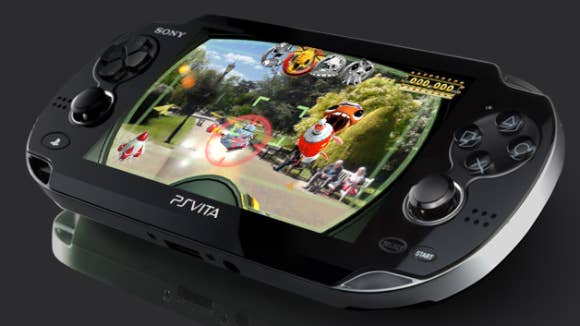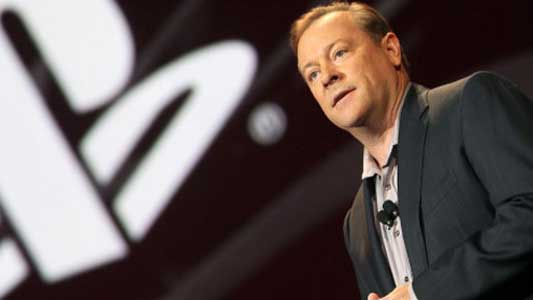Sony Interview: Jack Tretton Defends Vita, Dedicated Consoles
The SCEA boss remains optimistic about consoles, says social and free-to-play are just "an additive diversion"
There are a lot of people looking to bury the PS Vita these days. Sales haven't exactly been blockbuster and the software lineup to date has been so-so, at best.
Even Sony itself has sent some mixed signals. At its pre-E3 press conference in June, the company promised 60 new Vita games this year - then only showcased three over the next hour-and-a-half. Despite that, Sony is telling investors it expects to sell 10 million units this fiscal year (which ends March 31, 2013), largely on the strength of its holiday lineup (which includes PlayStation All Stars: Battle Royale, Assassin's Creed 3: Liberation and Call of Duty: Black Ops Declassified).
Not surprisingly, Jack Tretton is a big proponent of the system. The Sony president and CEO of Sony Computer Entertainment America notes that the handheld business, like the console business, is a marathon, not a sprint - and a system doesn't have to break day one records to be a success in the long run.
"In this industry, you can't get too high or too low, because it moves very quickly," says Tretton. "I think there's an acceptable number - and [the number] we've sold: That's acceptable. If it was triple that, I'd be happier. If it was one-third, I'd be disappointed."
"I feel much better about [Vita] now than I did four months ago"
Jack Tretton
Tretton points out that even the PlayStation 3 survived a bumpy start - and while that system isn't the king of the console hill like the PS2 was in the previous generation, it's still an incredibly popular and profitable device. And Sony expects that to be true of the Vita as well.
"Anything with great rewards is going to come with great challenges," he says. "We felt if the tech was there, and the game support was there, then the audience would be there. … I feel much better about it now than I did four months ago."

That's good news for Sony, which is relying heavily on the PlayStation division to help reverse the company's struggling fortunes. The ascension of Kaz Hirai, who oversaw the PlayStation unit during the PS2 heyday, to CEO put an additional focus on Tretton's division. That's a lot of pressure, given the hurdles Sony must overcome.
Earlier this month, the electronics giant reported a loss of 24.6 billion yen ($315 million) in its fiscal first quarter, versus with a 15.5 billion yen loss the previous year. The games unit saw a notable decline in sales as well, selling 800,000 fewer hardware units and coming in at an operating loss (which is unusual for the division). Software sales were also down.
Still, Tretton says he's excited to face the challenges of being one of the company's three pillars (along with mobile and digital imaging) - especially since he remembers the days when the PlayStation was far from the company's favorite child.
"I think it's the best news I could ever hear," he says. "When I joined Sony Computer Entertainment, I'd meet people from other Sony divisions. I'd be at an industry event and they'd read my name badge and say 'Sony Computer Entertainment? What the hell is that? I work for Sony music.' Sony Computer Entertainment was very much an offshoot and not an intimately familiar division of Sony. … To go from there, where you're a science experiment, for lack of a better word, to one of the three major pillars of the corporation is great."
"There's a place for social and freemium, but it's not going to replace the business models that are out there"
Jack Tretton
Some critics have questioned Sony's reliance on the PlayStation division, noting the emergence of smartphones has curbed demand for dedicated handheld devices. They openly wonder about the longevity of console systems as well. And they point to the rise of social and free-to-play games.
Tretton, though, says he's not worried about any of that.
"I think the opportunity to be in the console business is greater than ever before," he says. "[Social and free-to-play] is a business I think a lot of companies are learning is difficult to sustain for the long term. It's an adjunct or it's an add-on, but it's not where gaming is headed. It's an additive diversion. There's a place for social and freemium, but it's not going to replace the business models that are out there."
And while many gamers are complaining about the ongoing trend of sequel-itis and an increasing focus by publishers on action games, Tretton says that's the nature of the industry - and reminds players that no trend lasts forever.
"I think it tends to go in cycles," he says. "If somebody comes out with a game people enjoy, it draws people to that genre. Shooters have been bigger the past few years. I think they're not just the same game done with a different storyline, they're taking that genre and expanding on it. … Sometimes racing is really relevant. Sometimes it's not. The same thing happens with sports, or RPGs. … I don't think our industry is any different. [In any form of entertainment], you're going to get a herd mentality moving to where the consumer is."









